How a local NGO is cushioning girls, women from the effects of covid-19

Susan Otieno ActionAid Kenya Executive Director
How a local NGO is cushioning girls, women from the effects of covid-19
By Lilian Kaivilu
@liliankaivilu
As the country grapples with the effects of covid-19, ActionAid Kenya has stepped up to cushion vulnerable Kenyans in seven counties. Susan Otieno, ActionAid Kenya Executive Director spoke to Lilian Kaivilu on the measures that the organization has put in place to protect vulnerable groups from economic effects of covid-19.
You just flagged off some hygiene kits to different counties this morning. Tell us more.
Today we were flagging off hygiene kits; items received from Uniliver out of a partnership between Uniliver UK aid support as well as ActionAid working with our ActionAid office in London. We are reaching out to seven counties including Nairobi, Mombasa, Kilifi, Embu, Isiolo, Kakamega and Migori.
Why these counties?
The counties were selected based on the assessment of preparedness and engagement and the numbers that were being estimated as vulnerable community members. In each of these areas, we have to work with people who are living in poverty and exclusion. In Nairobi and Mombasa, the distribution will be happening in informal settlements. In the other counties, we will be working with communities in that are extremely marginalized. Such areas include Marafa in Kilifi, Makima in Embu, Kwisero in Kakamega and Kuria in Migori County.

In Isiolo, the population is largely pastoralist. How do you plan to carry out the distribution and ensure maximum impact?
In Isiolo, we will cut across the county because of the terrain and how the people are spread. We do not work in isolation. We work with the communities and so there is a tracking system. We have an SMS platform where communities indicate where they are during humanitarian interventions. We have worked in Isiolo for over 15 years with WFP and have a mechanism of tracking the community members as they move. The same mechanism is embedded in our programs. We also work with the community members.
What is in the box?
There is soap. We consider availability of soap as an opportunity to maintain hygiene standards. We have done water tracking and some rehabilitation of water points. In a place like Magarini, we have helped pipe the water closer to them from the river. So now they need soap. With soap then we can now determine what else the community is lacking.
The government is now talking of home-based care. How prepared are we for this?
In many cases, women bear the burden of home-based care. We believe that if we target them, we will be minimizing the spread because she will take care of the sick person back at home and take care of the family at large. Our focus then should be how to provide such care givers with the resources and the right information in order to help them prevent the spread of covid-19.
In your opinion, is there hope for women who have or are at risk of experiencing domestic violence as a result of the current containment measures?
There is a way out. Domestic violence has a shadow. There are certain indicators that tell you that you are living with an abuser. And that is what we train the women; to identify these indicators as early as possible. The SMS platform should be adopted universally as it leads to the point of help. It is the same platform that the women used to mobilized to get flood lights in the slum areas. This is also why we are using the cash transfer system to give the women alternative means of income.

